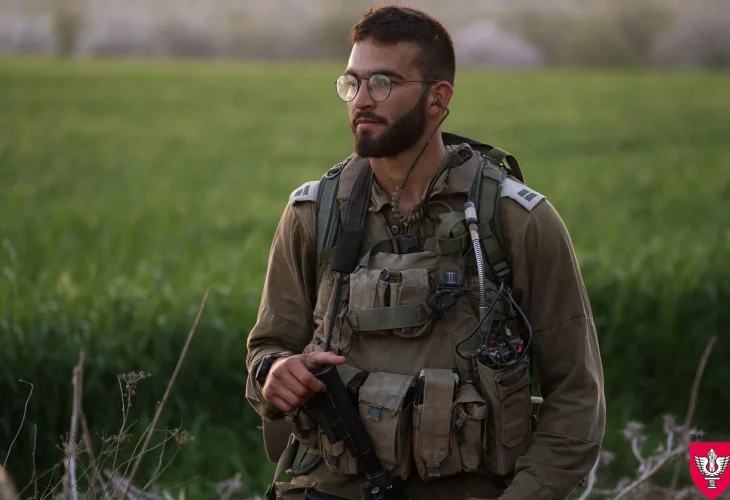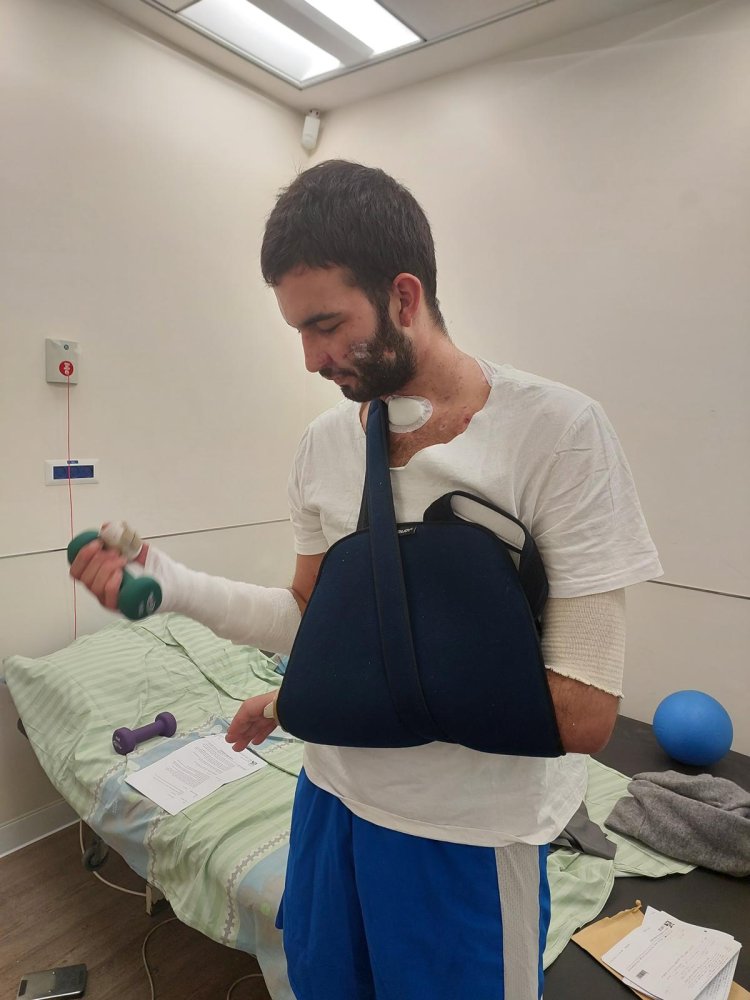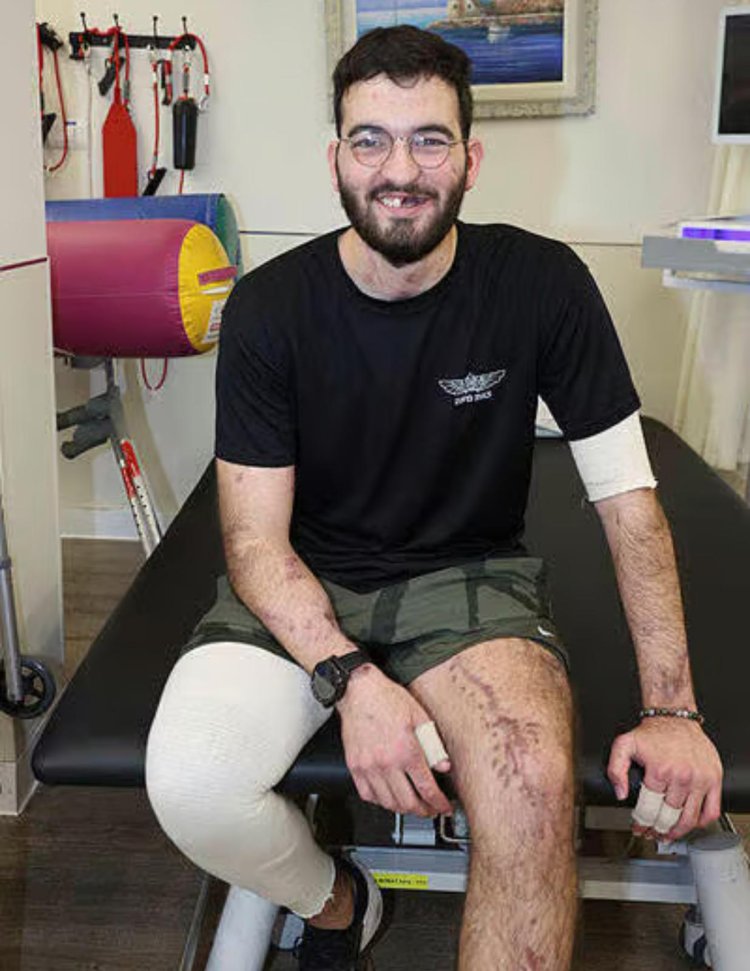A Journey of Healing: Roy's Remarkable Recovery Story
Over a year after being critically injured by an anti-tank missile and considered the most severe case at Rambam Hospital, Roy shares his rehabilitation journey and the miracles along the way, along with a message for wounded soldiers and their families.

Imagine this moment: you awaken in a hospital after four days shrouded in darkness. Your body is battered and in pain, you're weak and confused. Then, through the haze, you realize you can't move your hand, nor can you speak—you're not truly grasping what's happening around you.
These were the feelings Roy, a career officer wounded in the war, experienced when it dawned on him that his life was starkly divided into before and after, and that nothing would return to how it once was.
Roy was one of the most critically injured patients hospitalized at Rambam during the war, and just days after his injury, he knew he was embarking on a long and grueling rehabilitation journey. Since then, he has waged a battle for his life, which eventually evolved into a fight for his quality of life, accompanied by many miracles along the way.

Hundreds of Wounds
"It was in the early days of the war," Roy recalls the day he was severely injured. "I was in the field with my soldiers, and during an operation, I decided to dig protective trenches to use as shelters in case of firing or other incidents. At this point, they must have spotted the vehicle I was on, and an anti-tank missile was fired directly at us."
The injury was severe, affecting all parts of Roy's body, except the areas protected by his helmet and vest, which saved his life. "I had shrapnel all over, in some places resulting in real holes and fractures, and there was also a very serious facial injury," he describes. "The miracle was that the shrapnel stopped just millimeters from a vital blood vessel."
Were you conscious?
"Yes, I was conscious the whole time. Something in my head told me I had to stay focused and not close my eyes. I even tried to help the medics and doctor who treated me. But honestly, I didn't even begin to comprehend the severity of the situation and what was happening. The only understanding I had was that there was a massive, powerful event, but I didn't pay attention to what was happening to my body. Especially since I didn’t feel any pain—adrenaline and survival instincts probably made me feel nothing at all."
He was airlifted to Rambam Hospital, and only when he was transferred from military to civilian care did Roy start experiencing blurred surroundings and sinking into a fog of semi-consciousness. "I remember one of the doctors told me, 'You're at Rambam, everything will be okay,' and then, like hitting a light switch, I lost consciousness."
The next time Roy opened his eyes was four days later after having undergone surgeries and intensive treatments to stabilize his condition. "I gradually regained consciousness on the fourth day of hospitalization, and I remember, alongside dealing with the pain and limitations and understanding that I was seriously injured, there was an incredible feeling," he reveals. "I felt embraced from all sides, both by family members who moved into the hospital with me and by the medical staff who surrounded me indescribably. They weren’t just doing their job; they genuinely devoted themselves, wanting to help as much as possible. Today, I understand that if I hadn’t received the proper treatment at the right time, I’d be in a completely different place, whether physiologically or, worse yet, not here at all."
How was your condition when you woke up?
"Now I know it’s serious, but back then, I didn’t grasp the extent of my physical injuries. At first, I felt weakness throughout my body and couldn’t move, but I told myself, 'This must be a side effect of painkillers.' Later, I noticed I couldn’t move my hand and thought it was a fracture. It wasn't until later that I learned my hand was paralyzed due to nerve damage and torn tendons. It took several days for me to understand that I wouldn't be released soon and that I was embarking on a serious rehabilitation journey that would take more than a day or two."
How did you feel about this?
"Honestly, it was very difficult for me to accept reality, but the hardest part was realizing that I wouldn't return to fight, after seeing my future in the military. This understanding only hit later because initially, I naively believed I would be hospitalized for a few days and then return to battle. Maybe I was a bit arrogant or misunderstood, and when the realization that my military mission was over hit me, it was challenging on so many levels."
Roy takes a deep breath but quickly emphasizes: "Despite all the difficulty, I never regretted what happened. I was completely at peace with the activities I did, and needless to say, like every other soldier, I took into account all the risks and was very aware of them."

Learning About Yourself Anew
One of Roy's unforgettable moments in the intensive care unit was when Dr. Yaron Bar Lavi, the department head, approached his bed. "The doctor initially came to encourage me, and then he spoke directly to me about my condition," he recounts. "He explained that I had been in life-threatening danger, but thank Hashem, I survived it miraculously. He added, 'You have multiple injuries, the situation is still serious, but these are wounds you can recover from. You will see that everything will be fine.' That straightforward talk, without any frills, strengthened me greatly. I decided that after fighting for my life, I was setting out on a battle for quality of life. This journey, by the way, isn't over even today—one year and a month after the incident. I am still undergoing treatments, in rehabilitation, and doing physical therapy exercises. I've come a long way since I first arrived, but I’m, of course, far from returning to what I was."
What have you gone through over the past year?
"After two weeks in intensive care, I was moved to the oral and maxillofacial department, where I underwent crucial treatment because my face was seriously injured. Afterwards, I was released, not because I was fully healed, but because I was transferred to the rehabilitation center at Loewenstein Hospital in Ra’anana, aiming to start rehabilitation concurrently with treatment. Meanwhile, I continued receiving treatments at the Beit HaLochem and at various organizations supporting wounded soldiers. To this day, my daily routine revolves around the injury, but I am gradually returning to everyday life, trying not to get absorbed only in treatments, but to open horizons and realize there is more beyond that."
In case you're curious, Roy notes that he's studying courses that interest him and has also discovered new hobbies he enjoys but never knew before, such as hiking in nature, reading books, and more. "I’m trying and experimenting, learning a lot of new things about myself," he highlights the positive angle that emerged from the circumstances.
Roy takes this opportunity to share a message with soldiers in similar situations: "One saying that has stayed with me since my military service is 'It depends on me alone,' and it encourages me all along. Because it's clear that it’s not easy to get sucked into such a situation, and it's a painful process even when you know you'll never return to your normal life. But it's crucial to remember that we are responsible for our state of mind. The goal is to simply cling to the good, live with what is, and be grateful for what you've received. Because just being alive—that’s a gift."

